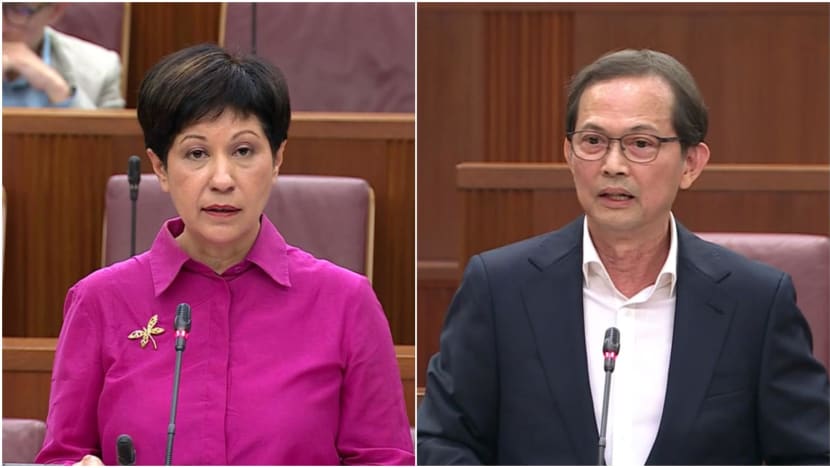Indranee and Leong Mun Wai clash in parliament over Singapore's fertility rate
Mr Leong also drew a sharp rebuke from Speaker Seah Kian Peng for his “super long” preambles to his clarifications.
��

Minister in the Prime Minister's Office Indranee Rajah and Non-Constituency Member of Parliament Leong Mun Wai speaking in parliament on Feb 5, 2025.

This audio is generated by an AI tool.
SINGAPORE: A heated exchange erupted in parliament on Wednesday (Feb 5) between Progress Singapore Party's (PSP) Leong Mun Wai and Minister in the Prime Minister’s Office Indranee Rajah over the government’s efforts to address Singapore’s declining fertility rate.
Mr Leong, a Non-Constituency Member of Parliament, also drew a sharp rebuke from Speaker Seah Kian Peng for his “super long” preambles during clarifications.
The debate, which lasted more than seven hours, centred on a motion tabled by MPs Hany Soh (PAP-Marsiling-Yew Tee) and Zhulkarnain Abdul Rahim (PAP-Chua Chu Kang), calling for the continued review and updating of policies to better support families and promote marriage and parenthood.
Mr Leong proposed amending the phrase “continued review and updating of policies” to “reimagination”, but the amendment was rejected and the original motion passed.
Ms Indranee opposed the amendment, saying that the government had already started the “reimagination process” in the form of Forward SG - an effort launched in 2022 to seek feedback on refreshing Singapore's social compact.
Supporting Singaporeans in starting and raising families has been and continues to be a top national priority, said Minister in the Prime Minister’s Office Indranee Rajah, who oversees the National Population and Talent Division. In Parliament on Wednesday (Feb 5), she said families are the building blocks of Singapore society, the first line of support and a key pillar of the country’s social compact. She outlined details of how, in the past five years, the Government has made “major shifts and bold moves” to help families secure affordable homes, manage the costs and stresses of raising children and balance work and family responsibilities. While a wide range of financial support is already available, a new scheme for large families is on the way with details to be announced in Budget 2025. Ms Indranee said that factoring in investments in the early childhood sector and upcoming parental leave enhancements,��marriage and parenthood initiatives are expected to cost the Government close to S$7 billion in FY 2026, up from over S$4 billion in 2020. However, support for families goes beyond what the Government can do, she said. A whole-of-society approach is needed if Singapore is to succeed in having more marriages and babies. The minister also explained why she could not support an amendment to the motion on the issue proposed by NCMP Leong Mun Wai, which called for a “reimagination” of Government policies.
She added that the amendment was tied to a policy - PSP's Affordable Homes Scheme - which was problematic.
“In the context of this amendment, reimagination entails certain policies put forward by PSP, of which a key one is the Affordable Homes Scheme, which constitutes amongst other things, a raid on the reserves, and I cannot support it,” said Ms Indranee.
The scheme proposes that land costs are deferred when flat buyers buy a flat from the Housing and Development Board (HDB). Such costs will be paid only if the flat is sold after the minimum occupation period, Mr Leong had said previously.
Mr Leong said he had “many questions to ask”, the first being whether the current situation was a “national emergency” and if Ms Indranee agreed with such an assessment.
Prompted by the Speaker to bring up all his questions at once, Mr Leong was eventually warned by Mr Seah that he should seek clarifications and not make another speech.
The two spoke over each other briefly, with Mr Seah saying he could not tell what Mr Leong’s clarification was.��
“I have said this many times to everyone, I’ll say it again. I allow you to make clarifications – as many as you want – but please make them and make it succinct,” said Mr Seah.
“Your preambles are super long … Don’t make mini-speeches. As with any other member who has spoken, you’re not allowed to make any more speeches.”
When Ms Indranee started to respond to Mr Leong, who took around 10 minutes to list his clarifications, she said the low fertility rate was a "very important national issue".
“Emergency sort of suggests the idea of all alarm bells ringing, everybody rushing around and so on,” she said.
“But our approach is, when you have a serious national issue, you look at it calmly, coolly, you understand what the issues are and you then take the necessary steps to address them.”
She reiterated that the government consults the public on what their concerns were and develops policies specifically in response to them.
Singapore’s low��total fertility rate is a result of the socio-economic circumstances created by the government policies, said NCMP Leong Mun Wai. Speaking in Parliament on Wednesday (Feb 5), he urged the government to “reset and reimagine” policies to create the conditions for Singaporeans to raise families. He proposed six ways to do so - ensure better job security and financial stability, slow down the increase in the cost of living, further defray the cost of prenatal gynaecological visits, childbirth and postpartum medical checks, strengthen workplace support for caregiving of children, recognise the contributions of homemakers and reduce the education pressure. Mr Leong stressed the need to urgently develop a national action plan and sought to amend the motion.
A FURTHER EXCHANGE
Mr Leong accused Ms Indranee of avoiding his questions, and challenged her on why Singapore does not compare itself to countries such as France, which has a total fertility rate (TFR) above 1.5.
“You have quoted a downward trend in the TFR as a global phenomenon. But other countries are able to maintain it at above 1.5 but we are 0.97 - does that difference mean it is a responsibility that the government has to take?” he asked.
Ms Indranee pointed out that France’s fertility rate has also dropped, mirroring the global decline.
“The suggestion seems to be that the government is responsible for 0.97 TFR. I think that that’s not the case,” she added.
She said that while it is a global trend affected by many factors, the government can do its best to make sure there is an environment that is as supportive of marriage and parenthood as possible, which is what it is currently trying to do.
“Any phenomenon that we observe, there’s always a systemic factor and there is a specific factor. Other countries have also experienced a general decline in the TFR, but if other countries are still maintaining at 1.5 and our TFR has gone right below 1 per cent, that is a difference,” said Mr Leong.
He added that the policies have not addressed the “specific factors”.
"You cannot just say that ‘oh everything is dropping, we can’t help it’, more or less, you’re saying we can’t help it, that cannot be the case, because then we will be really running towards extinction."
Ms Indranee pointed out that the government had never said that it “can’t help it”.
"As far as this government is concerned, we want to make a Singapore that is made for families and we are encouraging marriage and parenthood. It’s very odd because Mr Leong says the government says something when the government has not said any such thing," she added.
"Are policies working? We had policies in the past which took us up to a certain point. But remember, we recognise that changes need to be made and things need to be looked at afresh and that is exactly why we implemented Forward SG.
"And that’s why we embarked on the process of looking at what new policies we can introduce."
In Parliament on Wednesday (Feb 5), Minister in the Prime Minister’s Office Indranee Rajah and Minister of State for Social and Family Development Sun Xueling responded to clarifications sought by members of the House after debate on a motion on supporting Singaporeans in starting and raising families.
The two also clashed over whether Singapore should set a target for the country’s total fertility rate.��
Ms Indranee said she did not see how having a target would do anything to raise the fertility rate, whereas Mr Leong said the government cannot implement policies without aiming for a certain result.��
For things like infrastructure or economic goals, it makes sense to set a target, said Ms Indranee.
“But when it comes to emotions and when it comes to things like fertility, when it comes to personal decisions, those are very hard to quantify,” she said.��
The government is trying to create a country, a society, and an environment that is as encouraging and supportive as possible, she added.
“We hope that Singaporeans will be able to respond to that because the policies that we are putting in place have been based on the feedback that they have given us,” said the minister.







.jpg?itok=Zqv2Fcaz)


